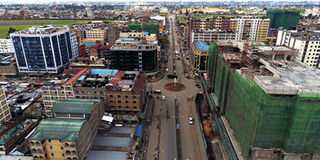Premium
Lockdown turns Eastleigh into a ghost town

An aerial view of Eastleigh, Nairobi, on May 7, 2020 as security forces enforce a lockdown. PHOTO | JEFF ANGOTE | NATION MEDIA GROUP
What you need to know:
- A good chunk of the rice, electronics, cooking oil, bar soap, sugar, textiles and spaghetti consumed in Kenya and beyond passes through Eastleigh.
- The government expressed concern over a large number of residents who escaped on Wednesday night to their relatives in South B and South C estates.
The first day of the cessation of movement order in Nairobi’s Eastleigh offered a glimpse into what other areas can expect in similar circumstances.
In scenes similar to those witnessed during political unrest, the security machinery, in a show of force, mounted at least 11 roadblocks to stop any form of movement into and out of the area.
On a normal day, the streets of Eastleigh, a major economic hub in the city, are a hive of activity as its countless malls overflow with shoppers.
According to the Eastleigh Business District Association, the area, which is at the heart of a complex network of trade connecting Asia, the Arabian Peninsula, Somalia and East Africa, turns over Sh10 billion a month.
A good chunk of the rice, electronics, cooking oil, bar soap, sugar, textiles and spaghetti consumed in Kenya and beyond passes through Eastleigh.
All the miraa consumed in Nairobi or exported to other countries makes a stopover in the hub nicknamed “Little Mogadishu” due to its huge Somali population.
All that came to a screeching halt on Wednesday night when the government stopped all forms of trade and movement in an effort to stop the spread of the virus. By Thursday morning, the bustling neighbourhood looked like a ghost town.
CONTACT TRACING
Helpless residents, who had not managed to relocate, watched as police took over their neighbourhood. The streets remained largely empty as the General Service Unit was deployed for the first time to deal with the coronavirus situation.
A crack unit comprising officers from the Directorate of Criminal Investigations and the intelligence service, with the help of mobile service providers, was deployed to trace those who had made contact with people who have tested positive for Covid-19.
Security sources told the Nation that over 200 people had been identified and rounded up by last evening. They will be tested next week after completing a week in quarantine.
There are indications that this number could rise to more than 1,000 by the end of the weekend.
The government expressed concern over a large number of residents who escaped on Wednesday night to their relatives in South B and South C estates.
“For those welcoming those (family) members, you are placing yourself in danger. Those within these areas, please remain in there,” Health Cabinet Administrative Secretary Rashid Aman warned.
“Prophet Muhammad said that if you hear there is a plague in a land do not enter it and if you are in a land and it is visited by a plague do not leave it,” the CAS quoted the Koran to appeal to the predominant Muslim community in the area.
FOOD SUPPLIES
Roadblocks were mounted near Rikana Supermarket and at St Theresa along First Avenue. The road links Eastleigh with Shauri Moyo, Makongeni and Pangani. Along General Waruinge Street, roadblocks were placed at Kariokor Roundabout, Pumwani Maternity and Madina Mall Roundabouts. Riots broke out in some areas, forcing the GSU to use tear gas cannons.
Expectant mothers going to Pumwani Maternity were forced to show their medical documents while those who said they were visiting their patients were not allowed.
Most residents said they feared they would not get food supplies for breaking their fast in the evening.
In Mombasa’s Old Town, five residents who had tested positive escaped before the lockdown was effected. Governor Hassan Joho said police were tracing them and they would face the law once apprehended.
Additional reporting by Mohamed Ahmed.






